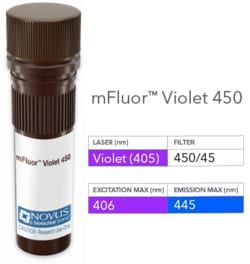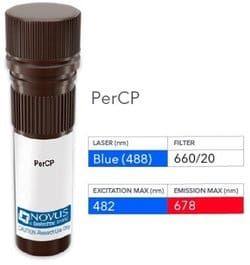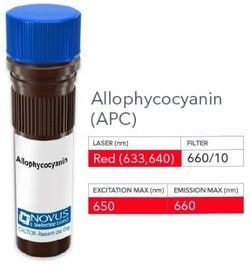CD44 Antibody (156-3C11), PE/Cy7, Novus Biologicals™
Manufacturer: Novus Biologicals
Select a Size
| Pack Size | SKU | Availability | Price |
|---|---|---|---|
| Each of 1 | N234520PEC7-Each-of-1 | In Stock | ₹ 63,991.00 |
N234520PEC7 - Each of 1
In Stock
Quantity
1
Base Price: ₹ 63,991.00
GST (18%): ₹ 11,518.38
Total Price: ₹ 75,509.38
Antigen
CD44
Classification
Monoclonal
Conjugate
PE-Cyanine7
Formulation
PBS with 0.05% Sodium Azide
Gene Symbols
CD44
Immunogen
Stimulated human leukocytes
Quantity
0.1 mL
Primary or Secondary
Primary
Test Specificity
Recognizes a cell surface glycoprotein of 80-95kDa (CD44) on lymphocytes, monocytes, and granulocytes (Leucocyte Typing Workshop V). Its epitope is resistant to digestion by trypsin and chymotrypsin. This monoclonal antibody selectively interferes with lymphocyte binding to lymph node, mucosal and synovial endothelium. The CD44 family of glycoproteins exists in a number of variant isoforms, the most common being the standard 85-95kDa or hematopoietic variant (CD44s). Higher molecular weight isoforms are described in epithelial cells (CD44v), which are believed to function in intercellular adhesion and stromal binding. CD44 immunostaining is commonly used for the discrimination of urothelial transitional cell carcinoma in-situ from non-neoplastic changes in the urothelium.
Content And Storage
Store at 4°C in the dark. Do not freeze.
Applications
Flow Cytometry
Clone
156-3C11
Dilution
Flow Cytometry
Gene Alias
CD44 antigen, CD44 molecule (Indian blood group), CD44R, CDw44, cell surface glycoprotein CD44, chondroitin sulfate proteoglycan 8, CSPG8, ECMR-III, Epican, Extracellular matrix receptor III, GP90 lymphocyte homing/adhesion receptor, HCELL, hematopoietic cell E- and L-selectin ligand, Heparan sulfate proteoglycan, Hermes antigen, homing function and Indian blood group system, HUTCH-I, Hyaluronate receptor, IN, LHR, MC56, MDU2CD44 antigen (homing function and Indian blood group system), MDU3CDW44, MIC4MGC10468, Pgp1, PGP-1, PGP-I, Phagocytic glycoprotein 1, Phagocytic glycoprotein I
Host Species
Mouse
Purification Method
Protein A or G purified
Research Discipline
Angiogenesis, Apoptosis, Cancer, Cell Biology, Core ESC Like Genes, Extracellular Matrix, Hematopoietic Stem Cell Markers, Immunology, Mesenchymal Stem Cell Markers, Oncogenes, Phospho Specific, Protein Kinase, Signal Transduction, Stem Cell Markers
Gene ID (Entrez)
960.0
Target Species
Human, Primate, Baboon
Isotype
IgG2a κ
Description
- CD44 Monoclonal specifically detects CD44 in Human, Chimpanzee, Monkey, Baboon samples
- It is validated for Flow Cytometry.



